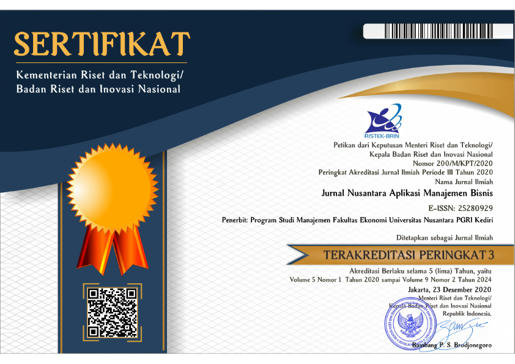Bagaimana Transformational Leadership Memfasilitasi Work Innovation: Peran mediasi Knowledge Management
DOI:
https://doi.org/10.29407/nusamba.v6i1.15228Keywords:
Transformational leadership, knowledge management, work innovation, partial least square (PLS).Abstract
This study aims to explore the effect of transformational leadership on work innovation and knowledge management, as well as the mediating role of knowledge management in the relationship between transformational leadership and work innovation. The research method used is quantitative research, with the use of partial least square (PLS) analysis techniques. The findings of this study reveal that transformational leadership has a positive and significant effect on work innovation directly. Transformational leadership also has a positive and significant impact on knowledge management. Then knowledge management plays a role as mediation in the relationship between transformational leadership and work innovation in a positive and significant manner in this study.
Downloads
References
Abdillah, W., & Hartono, J. (2016). Partial Least Square (PLS) Alternatif Structural Equation Modeling (SEM) dalam Penelitian Bisnis. Yogyakarta: ANDI
Alavi, M., and Leidner, D. E. (2001). Knowledge Management and Knowledge Management Systems: Conceptual Foundations and Research Issues. MIS Quarterly, 25(1) (Mar., 2001), pp. 107-136
Al-husseini, S., Elbeltagi, I., and Moizer, J. (2019). Transformational leadership and innovation: the mediating role of knowledge sharing amongst higher education faculty. International Journal of Leadership in Education. 1-25
Avolio, B. J., Bass, B. M., & Jung, D. I. (1999). Re-examining the components of transformational and transactional leadership using the Multifactor Leadership Questionnaire Suggestions for modi cation arose when a. Journal of Occupational and Organizational Psychology, 72, 441–462. https://doi.org/10.1348/096317999166789
Bass, B.M. and Avolio, B.J. (1994). Improving Organizational Effectiveness through Transformational Leadership. Sage: Thousand Oaks.
Bryant S.E. (2003). The Role of Transformational and Transactional Leadership in Creating, Sharing and Exploiting Organizational Knowledge. Journal of Leadership & Organizational Studies.9(4):32-44. doi:10.1177/107179190300900403
Donate, M.J. and Guadamillas, F. (2011). Organizational factors to support knowledge management and innovation. Journal of Knowledge Management, 15(6), pp. 890-914. https://doi.org/10.1108/13673271111179271
Ghozali, I. (2014). Structural Equation Modeling, Metode Alternatif dengan Partial Least Square (PLS) (4th ed). Semarang: Badan Penerbit Universitas Diponegoro.
Honarpour, A., Jusoh, A.,& Nor, K. D. (2012). Knowledge Management, Total Quality Management and Innovation: A New Look. Journal of Technology Management & Innovation, 7(3), 22-31
Jen-Chia, C. (2012). Factors that may mediate the relationship between transformational leadership and organizational innovation. African Journal of Business Management,. 6(3), pp. 1010-1018.
Král, P., & Králová, V. (2016) Approaches to changing organizational structure: The effect of drivers and communication. Journal of Business Research, 1-6. http://dx.doi.org/10.1016/j.jbusres.2016.04.099.
Lei, H., Leaungkhamma, L., and Le, P. B (2020). How transformational leadership facilitates innovation capability: the mediating role of employees’ psychological capital. Leadership & Organization Development Journal, 41(4), 481-499.
Muzakki., & Pratiwi, A. R. (2019). Kepemimpinan Transformasional dan Efikasi Diri Terhadap Kinerja Karyawan. Jurnal Ilmiah Manajemen dan Bisnis, 20(2), 82-91. https://doi.org/10.30596/jimb.v20i2.3264.
Odoardi, C., Battistelli, A., Montani, F., and Peiró, J. M. (2019). Affective Commitment, Participative Leadership, and Employee Innovation: A Multilevel Investigation. Journal of Work and Organizational Psychology, 35(2) 103-113
Rahim, R.A., Salleh, N.F., Ahmad, S.F.S., & Mustapha, R.M.R.. (2015). Exploring the Relationship Between Leadership Style, Knowledge Management Practices, and Innovative Behavior. Proceedings of the Colloquium on Administrative Science and Technology, pp 499-507.
Schreyögg, G., & Sydow, J. (2010). Organizing for Fluidity? Dilemmas of New Organizational Forms. Crossroads Organization Science, 21(6), 1251–1262.
Sholihin, M., dan Ratmono, D. (2013). Analisis SEM-PLS dengan WarpPLS 3.0. Yogyakarta: Penerbit ANDI
Singh, S.K. (2008). Role of leadership in knowledge management: a study. Journal of Knowledge Management, 12(4), pp. 3-15. https://doi.org/10.1108/13673270810884219
Soleh, M. (2008). Analisis strategi inovasi dan dampaknya terhadap kinerja perusahaan. Studi kasus: UKM Manufaktur di Kota Semarang. Semarang: Universitas Diponegoro.
Soliman, F. (2014). Attributes of the Learning-Innovation Transformational Leader, Learning Models for Innovation in Organizations. IGI Global
Sugiyono. (2015). Metode Penelitian Pendidikan Pendekatan Kuantitatif, Kualitatif, dan R&D, (21st ed.). Bandung: Alfabeta.
Supermane, S. (2019). Transformational leadership and innovation in teaching and learning activities: the mediation effect of knowledge management. Information Discovery and Delivery, 47(4), 242-250. https://doi.org/10.1108/IDD-05-2019-0040.
Downloads
Published
Issue
Section
License
Authors who publish with this journal agree to the following terms:
- Copyright on any article is retained by the author(s).
- The author grants the journal, the right of first publication with the work simultaneously licensed under a Creative Commons Attribution License that allows others to share the work with an acknowledgment of the work’s authorship and initial publication in this journal.
- Authors are able to enter into separate, additional contractual arrangements for the non-exclusive distribution of the journal’s published version of the work (e.g., post it to an institutional repository or publish it in a book), with an acknowledgment of its initial publication in this journal.
- Authors are permitted and encouraged to post their work online (e.g., in institutional repositories or on their website) prior to and during the submission process, as it can lead to productive exchanges, as well as earlier and greater citation of published work.
- The article and any associated published material is distributed under the Creative Commons Attribution-ShareAlike 4.0 International License












